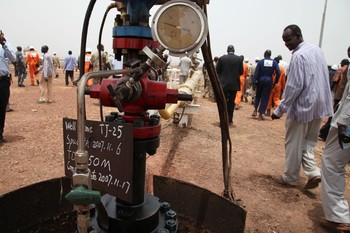Sudan proceeds with official notification to oil companies on shutdown
June 11, 2013 (KHARTOUM) – Sudan’s minister of oil, Awad Ahmed Al-jaz, has handed over official letters to oil companies operating in transfer and export of South Sudan’s oil through Sudanese territories ordering them to stop transfer and export operations of the southern oil within 60 days starting on June 9, 2013.

“In order to protect the facilities and to avoid any environmental hazards in the two countries, the shutdown shall be safely and smoothly carried out during a period of sixty days from the date of this letter” it added.
Operating companies which received the letters include Greater Nile Petroleum Operating Company (GNPOC), Petrodar Operating Company (PDOC) which is comprised of several foreign companies including the Malaysian national oil company Petronas, the Chinese China National Petroleum Corporation (CNPC), and the Indian Oil and Natural Gas Corporation (ONGC).
“Accordingly you are required to instruct the respective operating companies to submit their shut down execution plans and schedules for the Government’s approval within seven days from the date of this letter”.
The letter were handed during a meeting held at Sudan’s oil ministry headquarters and included Sudan’s oil minister, the foreign partners, and directors and deputy-directors of the oil companies.
Separately the Sudanese foreign ministry formally notified Juba of its decision.
“We would like to inform you that the Ministry of Petroleum will shut down the processing and transportation facilities in Sudan for the oil received from South Sudan,” read a letter sent from the Sudanese oil ministry to its South Sudanese counterpart according to Reuters.
Last Saturday Sudanese president Omer Hassan al-Bashir ordered the closure of all pipelines carrying oil from South Sudan. He told a public rally in the capital Khartoum that the move was in response to South Sudan’s funding of rebels fighting his government.
“O’ Awad [oil minister] tomorrow direct oil companies to close the pipeline and after that let them [South Sudan] take it via Kenya or Djibouti or wherever they want to take it”, the Sudanese president said.
“The oil of South Sudan will not pass through Sudan ever again,” Bashir added.
The Sudanese president said the decision was taken after thorough study to examine its advantages and drawbacks.
Al-Jaz, who briefed foreign partners on the cooperation agreements between Sudan and South Sudan, stressed that the two countries agreed to implement them as a package but South Sudan has shown lack of seriousness on implementing the security arrangements agreement which is considered the main pillar for implementing the rest of the agreements.
The deputy director of the GNPOC, Azhari Abd Al-Gadir, for his part, asserted that stoppage would neither impact the environment negatively nor damages the pipeline which would continue to transfer Sudan’s oil, saying that GNPOC is ready to deal with the decision and learn from its successful previous experience when South Sudan abruptly shut down its oil production.
The PDOC deputy director for oil operations, Mahmoud Mohamed Abd Al-Rahman, said that his company would implement the decision in coordination with Dar Petroleum Company which produces oil in South Sudan, pointing to the technical processes which should be applied in such circumstances.
The African country, which seceded from Khartoum in 2011 under a peace deal ending decades of civil war, produce around 300,000 bpd until its first shutdown in January 2012 in a row with Sudan over pipeline fees.
Oil used to be the main source for Sudan’s budget until southern secession in July 2011, when Khartoum lost 75 percent of its oil production and its status as oil exporter overnight.
Diplomats speaking to Reuters doubt Sudan will actually close the two cross-border export pipelines because its economy has been suffering without South Sudan’s pipeline fees.
(ST)
